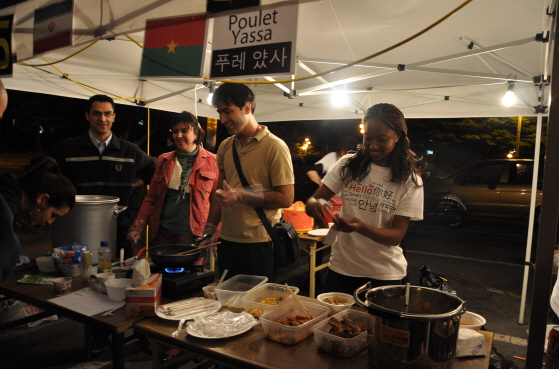
The name iPub is short for “international pub.” This pub, by far, stood out from others in that the iPub offered relatively differentiated dishes all from distinct countries. This is the third year of iPub’s particpation, and eight countries’ representatives were involved, from Austria, Burkina Faso, China, France, Germany, Iran, Ukraine and Vietnam.
Since the days before the actual festival, leaders or managers of each country were assembled for meetings to choose the dishes, search for, buy and prepare ingredients and lastly rehearse the making of the food. Although the main cooks were international students, Korean residents in DICE facilitated the whole process. Shin A-reum, a Korean student for whom it was the first time taking part in the iPub, said, “I helped the German students making cabbage noodles. It was a nice experience to learn foreign dishes naturally.”
On May 14, the DICE kitchen made a rattling noise from 8am. Students were busy pre-cooking for fast service. As the starting time approached, utensils and food were delivered to the booth area, where tables were arranged.
It did not take long for the booth area to be filled with curious and excited customers. They were able to look around and see all available unique dishes and even taste some samples before making choices and buying tickets. The menu board itself was quite dissimilar to the ones found in Korea, in that food descriptions, main ingredients and labels for vegetarians or non-beef and pork eaters were listed for each dish. A customer commented, “I bought the ticket and found out that the method of making the food was written on it. I thought that it was very considerate and I want to try it at home.”
The Vietnamese rice noodles and Chinese “zha-jiang-mian” were on high demand, not only because of their taste but also because of familiarity to Koreans. Piao Wenying, the manager of Chinese cooking in the iPub said, “Chinese researchers and graduate students in POSTECH also came to iPub to help. Some complemented on the food that we made and that was very pleasing.”
The French “toothsome crepe,” “best brownies ever” and German “igel-kuchen” desserts were also popular. Some eagerly tried for special dishes not commonly found in Korea such as the “borscht soup,” a red beet soup from Ukraine, “wiener schnitzel,” an Austrian pork cutlet with cranberry jam, “poulet yassa,” a chicken curry from Burkina Faso, “gheimeh,” an Iranian traditional stew with rice, and “krautnudeln,” German cabbage noodles.
Stefan Muller, an Austrian student, said, “I chose to make the pork cutlet with cranberry jam, because it is very traditional food in Austria and it is easy to make so I made it many times when I went to Serbia and the U.S. Although it was quite tiresome to prepare the ingredients, like with 10kg of pork, looking at people who enjoy eating this, I think it was definitely worth it.”
Food was sold-out quickly and the pub was closed earlier than expected. The dean of DICE, Lee Joo-young, recognized the hard work from all participants and said, “This was a chance to show our unity as a small community in POSTECH. I hope everyone who made this day possible, including the customers, enjoyed the iPub.”
The international community, DICE, is slowly coming to take shape, forming annual celebrations. For a globalised campus, events such as iPub should be actively supported and it is encouraged that other Koreans take interest in the cultural exchange.


